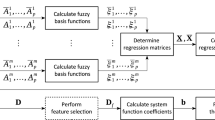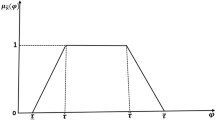Abstract
One of the problems associated to linguistic fuzzy modeling is its lack of accuracy when modeling some complex systems. To overcome this problem, many different possibilities of improving the accuracy of linguistic fuzzy modeling have been considered in the specialized literature. We will call these approaches as basic refinement approaches. In this work, we present a short study of how these basic approaches can be combined to obtain new hybrid approaches presenting a better trade-off between interpretability and accuracy. As an example of application of these kinds of systems, we analyze seven hybrid approaches to develop accurate and still interpretable fuzzy rule-based systems, which will be tested considering two real-world problems.
Similar content being viewed by others
References
Alcalá R, Casillas J, Cordón O, Herrera F (2002) Hybridization of components to improve the accuracy in linguistic fuzzy modeling. In: Proceedings of the 9th international conference on information processing and management of uncertainty in knowledge-based systems (IPMU 2002), pp 1969–1977
Alcalá R, Cano JR, Cordón O, Herrera F, Villar P, Zwir I (2003) Linguistic modeling with hierarchical systems of weighted linguistic rules. Int J Approx Reason 32(2–3):187–215
Alcalá R, Casillas J, Cordón O, Herrera F (2003) Applying rule weight derivation to obtain cooperative rules. In: Benítez JM, Cordón O, Hoffmann F, Roy R. (ed). Advances in soft computing – engineering, design and manufacturing. Springer, Berlin Heidelberg New York, pp. 139–147
Alcalá R, Casillas J, Cordón O, Herrera F (2003) Linguistic modeling with weighted double-consequent fuzzy rules based on cooperative coevolutionary learning. Int J Int Comput Aided Eng (to appear)
Alcalá R, Cordón O, Herrera F (2003) Combining rule weight learning and rule selection to obtain simpler and more accurate linguistic fuzzy models. In: Lawry J (ed) Modelling with words, Springer, Berlin Heidelberg New York (in press)
Bastian A (1994) How to handle the flexibility of linguistic variables with applications. Int J Uncertainty Fuzziness Knowledge-Based Syst 2(4):463–484
Bikdash M (1999) A highly interpretable form of Sugeno inference systems. IEEE Trans Fuzzy Syst 7(6):686–696
Casillas J, Cordón O, Herrera F (2002) COR: A methodology to improve ad hoc data-driven linguistic rule learning methods by inducing cooperation among rules. IEEE Trans Syst Man Cybern 32(4):526–537
Casillas J, Cordón O, Herrera F, Magdalena L. ed. (2003) Interpretability issues in fuzzy modeling. Studies in fuzziness and soft computing, 128. Springer, Berlin Heidelberg New York
Casillas J, Cordón O, Herrera F, Magdalena L. ed. (2003) Accuracy improvements in linguistic fuzzy modeling. Studies in fuzziness and soft computing, 129. Springer, Berlin Heidelberg New York
Casillas J, Cordón O, Del Jesus MJ, Herrera F (2001) Genetic tuning of fuzzy rule deep structures for linguistic modeling. Technical Report #DECSAI-01-01-02, Department of Computer Science and Artificial Intelligence, University of Granada
Cordón O, Herrera F (1997) A three-stage evolutionary process for learning descriptive and approximate fuzzy logic controller knowledge bases from examples. Int J Approx Reason 17(4):369–407
Cordón O, Herrera F (2000) A proposal for improving the accuracy of linguistic modeling. IEEE Trans Fuzzy Syst 8(3):335–344
Cordón O, Herrera F, Sánchez L (1999) Solving electrical distribution problems using hybrid evolutionary data analysis techniques. Appl Intell 10:5–24
Cordón O, Herrera F, Hoffmann F, Magdalena L (2001) Genetic fuzzy systems: evolutionary tuning and learning of fuzzy knowledge bases. World Scientific, Singapore
Cordón O, Herrera F, Zwir I (2002) Linguistic modeling by hierarchical systems of linguistic rules. IEEE Trans Fuzzy Syst 10(1):2–20
Cordón O, del Jesus MJ, Herrera F (1998) Genetic learning of fuzzy rule-based classification systems cooperating with fuzzy reasoning methods. Int J Intell Syst 13:1025–1053
Cho JS, Park DJ (2000) Novel fuzzy logic control based on weighting of partially inconsistent rules using neural network. J Intell Fuzzy Syst 8:99–110
Espinosa J, Vandewalle J (2000) Constructing fuzzy models with linguistic integrity from numerical data-AFRELI algorithm. IEEE Trans Fuzzy Syst 8(5):591–600
Fiordaliso A (2001) A constrained Takagi-Sugeno fuzzy system that allows for better interpretation and analysis. Fuzzy Sets Syst 118(2):307–318
Gómez-Skarmeta A, Jiménez F (1999) Fuzzy modeling with hybrid systems. Fuzzy Sets Syst 104:199–208
González A, Pérez R (1999) A study about the inclusion of linguistic hedges in a fuzzy rule learning algorithm. Int J Uncertainty Fuzziness Knowledge-Based Systems 7(3):257–266
Gürocak HB (1999) A genetic-algorithm-based method for tuning fuzzy-logic controllers. Fuzzy Sets Syst 108(1):39–47
Herrera F, Lozano M, Verdegay JL (1997) Fuzzy connectives based crossover operators to model genetic algorithms population diversity. Fuzzy Sets Syst 92(1):21–30
Hong TP, Chen JB (1999) Finding relevant attributes and membership functions. Fuzzy Sets Syst 103(3):389–404
Hong TP, Lee CY (1999) Effect of merging order on performance of fuzzy induction. Int Data Anal 3(2):139–151
Ishibuchi H, Nakashima T (2001) Effect of rule weights in fuzzy rule-based classification systems. IEEE Trans Fuzzy Syst 9(4):506–515
Ishibuchi H, Nozaki K, Yamamoto N, Tanaka H (1995) Selecting fuzzy if-then rules for classification problems using genetic algorithms. IEEE Trans Fuzzy Syst 3(3):260–270
Jin Y, von Seelen W, Sendhoff B (1999) On generating FC3 fuzzy rule systems from data using evolution strategies. IEEE Trans Syst Man Cybern 29(4):829–845
Krone A, Taeger H (2001) Data-based fuzzy rule test for fuzzy modelling. Fuzzy Sets Syst 123(3):343–358
Lee HM, Chen CM, Chen JM, Jou YL (2001) An efficient fuzzy classifier with feature selection based on fuzzy entropy. IEEE Trans Syst Man Cybern 31(3):426–432
Liu BD, Chen CY, Tsao JY (2001) Design of adaptive fuzzy logic controller based on linguistic-hedge concepts and genetic algorithms. IEEE Trans Syst Man Cybern 31(1):32–53
Mamdani EH (1974) Applications of fuzzy algorithms for control a simple dynamic plant. In: Proceedings of the IEEE 121(12):1585–1588
Michalewicz Z (1996) Genetic algorithms + data structures = evolution programs. Springer, Berlin Heidelberg New York
Nauck D, Kruse R (1999) Neuro-fuzzy systems for function approximaton. Fuzzy Sets Syst 101(2):261–271
Nozaki K, Ishibuchi H, Tanaka H (1997) A simple but powerful heuristic method for generating fuzzy rules from numerical data. Fuzzy Sets Syst 86(3):251–270
Pal NR, Pal K (1999) Handling of inconsistent rules with an extended model of fuzzy reasoning. J Intell Fuzzy Syst 7:55–73
Paredis J (1995) Coevolutionary computation. Artifi Life 2:355–375
Pardalos PM, Resende MGC (2002) Handbook of applied optimization. Oxford University Press, NY
Pedrycz W, Gudwin RR, Gomide FAC (1997) Nonlinear context adaptation in the calibration of fuzzy sets. Fuzzy Sets Syst 88(1):91–97
Roubos H, Setnes M (2001) Compact and transparent fuzzy models and classifiers through iterative complexity reduction, IEEE Transactions on Fuzzy Systems. 9:4: 516–524
Sánchez L, Casillas J, Cordón O, del Jesus MJ (2003) Some relationships between fuzzy and random set-based classifiers and models. Int J Approx Reason 29(2):175–213
Setnes M, Babuška R, Kaymak U, van Nauta Lemke HR (1998) Similarity measures in fuzzy rule base simplification. IEEE Trans Syst Man Cybern 28(3):376–386
Shi Y, Eberhart R, Chen Y (1999) Implementation of evolutionary fuzzy systems. IEEE Trans Fuzzy Syst 7(2):109–119
Sugeno M, Yasukawa T (1993) A fuzzy-logic-based approach to qualitative modeling. IEEE Trans Fuzzy Syst 1(1):7–31
Takagi T, Sugeno M (1985) Fuzzy identification of systems and its application to modeling and control. IEEE Trans Syst Man Cybern 15:116–132
Wang LX, Mendel JM (1992) Generating fuzzy rules by learning from examples. IEEE Trans Syst Man Cybern 22:1414–1427
Wang X, Hong J (1999) Learning optimization in simplifying fuzzy rules. Fuzzy Sets Syst 106(3):349–356
Yam Y, Baranyi P, Yang CT (1999) Reduction of fuzzy rule base via singular value decomposition. IEEE Trans Fuzzy Syst 7(2):120–132
Yen J, Wang L (1999) Simplifying fuzzy rule-based models using orthogonal transformation methods. IEEE Trans Syst Man Cybern 29(1):13–24
Yen J, Wang L, Gillespie CW (1998) Improving the interpretability of TSK fuzzy models by combining global learning and local learning. IEEE Trans Fuzzy Syst 6(4):530–537
Zadeh LA (1975) The concept of a linguistic variable and its application to approximate reasoning, Parts I, II and III. Inform Sci 8, 8, 9,:199–249, 301–357, 43–80
Author information
Authors and Affiliations
Corresponding author
Additional information
This work has been supported by the spanish cicyt project tic2002-04036-c05-01 (keel).
Rights and permissions
About this article
Cite this article
Alcalá, R., Alcalá-Fdez, J., Casillas, J. et al. Hybrid learning models to get the interpretability–accuracy trade-off in fuzzy modeling. Soft Comput 10, 717–734 (2006). https://doi.org/10.1007/s00500-005-0002-1
Published:
Issue Date:
DOI: https://doi.org/10.1007/s00500-005-0002-1




